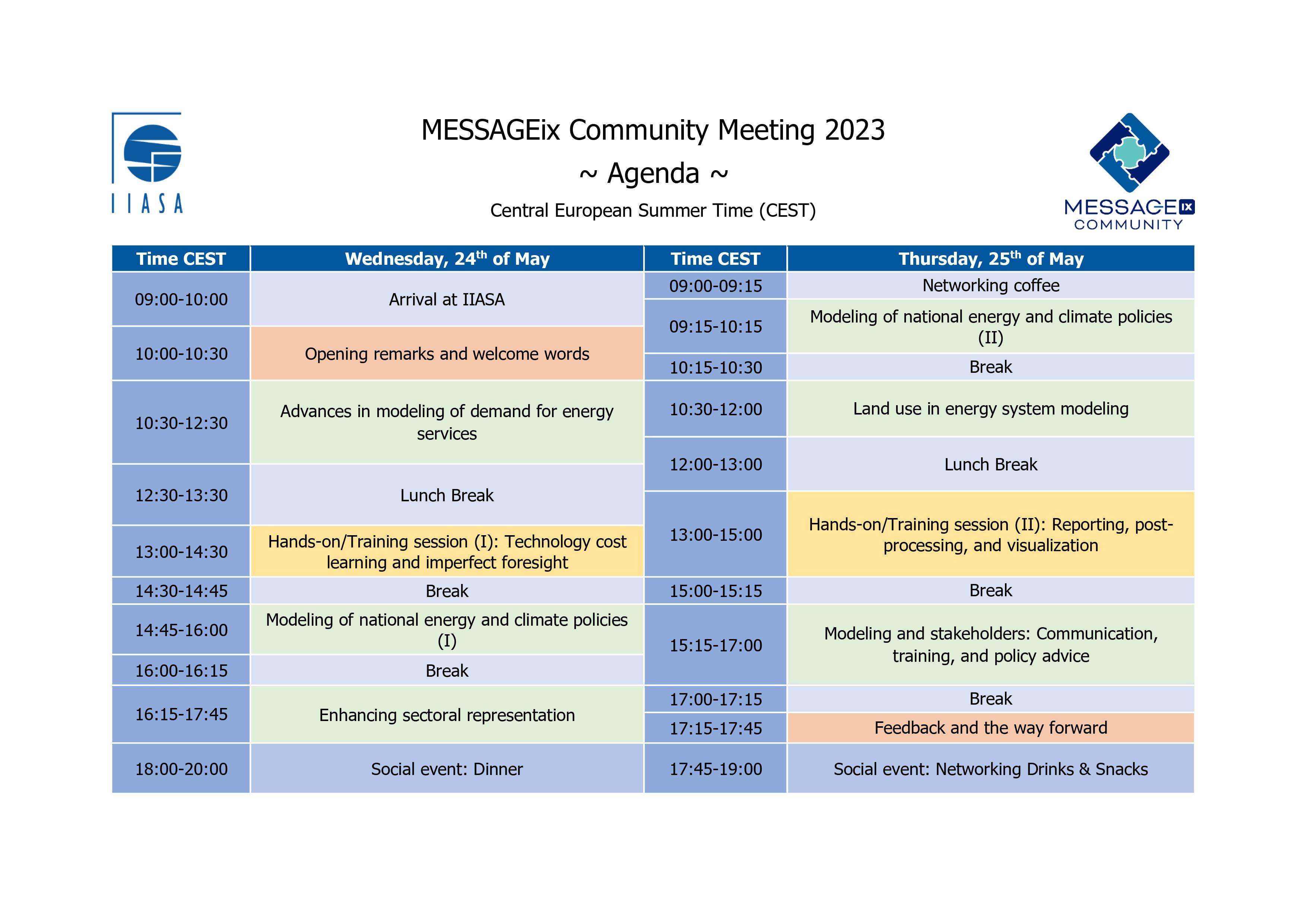
The Energy, Climate, and Environment (ECE) Program will host the second MESSAGEix Community Meeting in May 2023. The meeting aims to bring together researchers working on integrated assessment and/or energy system modeling using open source software.
The MESSAGEix Community Meeting is a platform for showcasing new developments and features of the MESSAGEix modeling framework, sharing knowledge on various modeling approaches and applications of the framework, and discussing best practices in model-based policy analysis. The meeting is a place for facilitating collaboration between MESSAGEix users from around the world, by creating a forum where users can share their latest research outcomes and modeling experiences.
The Community Meeting also aims to inspire new users of the MESSAGEix framework on the range of available possibilities and link them with other users in order to help them advance their modeling work.
With this second meeting, we hope to further grow and sustain the MESSAGEix community who is already contributing to major international assessments and many scenario studies at global, national, and subnational scales. Sharing knowledge and mutual support will help find new ways to apply modeling for offering solutions to complex problems related to climate change mitigation, impacts, adaptation, and energy as well as broader sustainability transitions.
For attending the meeting and receiving related material, please kindly fill in the online registration form. The meeting will be in a hybrid format, with the possibility of attending online or in person.
Below, we provide a draft agenda, which is subject to minor changes based on the availability of presenters. Please revisit this webpage closer to the dates of the meeting for a more updated agenda. All times are in Central European Summer Time (CEST).
Please see below for a more detailed agenda.
As you suggested last year, we have asked all presenters to please send us (a draft version of) their presentations prior to the meeting so that you can already study the presentation materials beforehand and can focus more on the talk during the talk. Please see the collection of presentation material to find out if the talk you are interested in has already been uploaded. We will update this collection whenever we receive new material.
Please note that only people who filled out the registration survey are able to see the collection.
Detailed Agenda - Wednesday, May 24:
Opening remarks and welcome words
10:00-10:30: Opening remarks and welcome words
A warm welcome and introduction to this year's MESSAGEix community meeting delivered by Volker Krey, Behnam Zakeri, Fridolin Glatter, and Paul Natsuo Kishimoto (all IIASA).
Advances in modeling of demand for energy services
10:30-11:00: MESSAGEix-Buildings
Alessio Mastrucci (IIASA)
MESSAGEix-Buildings is a framework for modelling the energy and material demand of the global building sector under different socioeconomic, technology, climate and policy scenarios. This presentation will provide an overview of the modelling framework and illustrative applications in climate change mitigation and sustainable development scenarios.
11:00-11:30: MESSAGEix-Transport
Paul Natsuo Kishimoto (IIASA)
11:30-12:00: MESSAGEix-Materials: Integrated assessment of emission mitigation scenarios in the petrochemical sector
Florian Maczek (IIASA)
MESSAGEix-Materials is a MESSAGEix submodule that represents material cycles of the economy by modelling industrial processes and connected material flows explicitly. It was created with the goal to understand and evaluate implications of material cycles on energy systems and emissions.
In this presentation, we show the latest model additions in the petrochemical sector and an exemplary assessment of the sector in the context of climate change mitigation.
12:00-12:30: Coupling MESSAGEix and EXIOBASE based on the Make and Use Framework
Maik Budzinski (Aalborg University)
This talk will focus on coupling MESSAGEix with a multi-regional input-output model. The method and results are related to this publication.
Please use Firefox or Google Chrome to render the presentation material.
Hands-on/Training session (I): Technology cost learning and imperfect foresight
13:30-14:30: Technology cost learning & recursive dynamic implementation in MESSAGEix
Yoga Pratama (IIASA)
The goal of this session is to introduce technology cost learning and myopic/adaptive optimization approach implementation in MESSAGEix. Here, We separate economies of scale and
learning effects in technology cost improvements. A method to estimate learning and economy of scale parameters from historical data for MESSAGEix input is also introduced.
Modeling of national energy and climate policies (I)
14:45-15:30: Enabling or hampering? The impact of investors’ expectations and climate risk assessment on mitigation scenarios
Alaa Al Khourdajie (Imperial College London; IIASA)
Recently, the literature provided a framework to model the feedback loop between investors’ expectations and risk assessment, and the allocation of investments in the economy, by linking process-based Integrated Assessment Models (IAMs) to a climate financial risk (CFR) model and climate stress-test (Battiston et al., 2021).
In this paper, we operationalise this approach through an application of the MESSAGEix-GLOBIOM modelling framework across a whole range of energy technologies and climate scenarios and the feedback loop with the CFR. As a main innovation of the state of the art, we estimate the probability of default of firms characterised by different energy technology assets (such as coal, gas and oil, as well as solar, wind and other renewable technologies), conditioned to different mitigation scenarios, characterised by differing temperature targets and immediate versus delayed emission reduction actions. We then model the adjustment in the risk profile of these assets, and the hurdle rates on loans, with a dynamic climate credit risk model. These resulting trajectories of financing costs (i.e. hurdle rates and yields) for energy technology assets across the selected scenarios are then fed back into MESSAGEix-GLOBIOM in order to update the output trajectories, which in turn affect the mitigation scenarios. This is an ongoing work, and the aim is to present the latest findings during this workshop.
Please provide feedback for the draft paper in the collection of presentation materials.
15:30-16:00: Achieving the Net-Zero Emission Target: A meta-analysis of Turkish Energy and Emission Scenarios
Görkem Güngör (Hacettepe University)
I am going to outline "Achieving the net-zero emission target: A meta-analysis of Turkish energy and emission scenarios", which I submitted for the RFF-CMCC Summer School.
The climate target of the Paris Agreement to limit the temperature increase to 1.5 °C in 2100 and the ongoing conflict in Ukraine forced the European Commission to revise the climate policy from low-carbon transition to phase-out of fossil fuels. The energy markets are vulnerable to the price volatility of fossil fuel resources due to the instability of the supplier countries. Therefore, the European countries with stringent climate mitigation aim for inter-regional cooperation with Mediterranean countries having renewable energy potential. The Turkish national energy plan, announced on January 2023, projects an increased supply of renewable primary energy sources from 24.6 Mtoe in 2020 to 48.7 Mtoe in 2035. But, the achievement of the net-zero emission target for 2053 is vague due to the uncertainties in hydrogen demand for exporting to Europe and blending domestic natural gas in Turkey. In the first part of this study, the authors aim to conduct a meta-analysis of 26 energy and climate modelling studies for Turkey by focusing on the synergies and trade-offs between the European and Turkish energy and climate policies. In the second part of this study, the authors aim to analyse the uncertainties using Bayesian inference by focusing on the low-carbon transition of the buildings and transport sectors.
Enhancing sectoral representation
16:15-16:45: Power sector modeling in Korea
Changwoo Lee (Greenhouse Gas Inventory & Research Center of Korea)
South Korea's greenhouse gas emissions amounted to 727Mt in 2018, comprising 1.5% of global emissions (UNEP). The energy conversion and industrial sectors accounted for approximately 71% of the total emissions. In addition, South Korea has established carbon neutrality for 2050 and a National Determined Contribution (NDC) target of a 40% reduction compared to 2018 by 2030.
Greenhouse Gas Inventory and Research Center (GIR) of Korea plays a vital role in establishing national targets by conducting inventory reports, modeling research, and responding to the United Nations Framework Convention on Climate Change (UNFCCC). Recently, there has been an increasing demand for a comprehensive energy system model that can balance the economic feasibility of energy use and production for enhanced transparency and cross-sector analysis of the national emission reduction plan. Therefore, we have been developing the bottom-up model using MESSAGEix since 2022.
In this community meeting, we will introduce the scope, structure, and characteristics of the MESSAGEix-GIR. Also, we will share scenarios and preliminary results, primarily focusing on the power sector.
16:45-17:15: Seasonal Pumped Hydropower Storage role in responding to climate change impacts on the Brazilian electrical sector
Natalia Weber (Universidade Federal do Rio Grande do Sul)
As part of my Phd thesis I proposed a methodology that links MESSAGEix to regional climate model simulations. To integrate the climate change data with the energy system, model a methodology in three main steps were designed. A novel aspect of this approach was the development of a model that optimizes SPHS technology with the seasonal variability of renewable sources for three climate change scenarios. Additionally, a new detailed hydropower representation was defined for the SPHS implementation on the Brazilian Electricity System MESSAGEix Model (BESMM). Climate change adds a new dimension to this approach as it has evidence of increasing the seasonal imbalance of variable renewable resources in Brazil. BESMM results indicate that SPHS played a fundamental role in achieving a 100% renewable matrix by 2100 in scenario RCP 2.6, as well as increasing renewable energy endowment in scenarios RCP 4.5 and RCP 8.5. SPHS showed to be a key technology to enable offshore wind power to gain traction within the BESMM matrix, considering that offshore wind power has high capacity, but one of the highest seasonality indices. A reduction of up to 68% of CO2 emissions was achieved in scenarios with SPHS when compared with scenarios without SPHS.
17:15-17:45: Impacts of Seasonal Pumped Storage Hydropower in Brazilian Power Sector
Amaro Pereira (COPPE/UFRJ)
Detailed Agenda - Thursday, May 25:
Modeling of national energy and climate policies (II)
09:15-09:45: Integrated Assessment Modeling of degrowth models for Australia
Mengyu Li (University of Sydney)
In this work, we address this problem by modifying one of the common IAMs – MESSAGEix – to make it compatible with degrowth scenarios. We also simulate scenarios featuring low and negative growth in a high-income economy (Australia). We achieve this by detaching MESSAGEix from its monotonically growing utility function, and by formulating an alternative utility function based on non-monotonic preferences. The outcomes from such modified scenarios reflect characteristics of degrowth futures, including reduced aggregate production and declining energy and emissions.
09:45-10:15: Bhutan Energy System-Drivers Analysis on Energy-Food-Water and Health Nexus
Miho Kamei (Institute for Global Environmental Strategies)
Food system in Bhutan is one of the priority issues in the long-term policy in Bhutan. Currently agriculture system in Bhutan has not been well-developed adopting to effective local infrastructure network (energy-water etc). Also social infrastructure and market system are not sufficient for increasing domestic productions and food security.
Analysis uses socio-economic framework (SSP Bhutan) and MESSAGEix and GAINS model to evaluate the cross-cutting issues of technological & policy options to investigate how Bhutan's local food system can be transformed to become Bhutan's GNH featured self-sufficient economy.
Land use in energy system modeling
10:30-11:00: Introduction to Land Use Emulator in MESSAGEix
Oliver Fricko (IIASA)
The land-use emulator integrates a set of land-use scenarios into the MESSAGEix energy system model. The linkage between an energy model, here MESSAGEix, and a set of land-use model scenarios, derived in this case by GLOBIOM, is important to explore the potential of bioenergy and the implications of using biomass for energy generation on emissions, the cost of the system, and related land-use implications.
Together, we will take a look at the workflow behind the land-use scenario integration. We will look at both conceptual and technical aspects and explore how to validate the setup by taking a glimpse at some exemplary results.
11:00-11:30: Land Use Model MAgPIE Linkage to MESSAGEix
Jan Steinhauser (IIASA)
What’s better than one land-use model linked to your energy model? TWO land-use models linked to your energy model, obviously! While the MESSAGEix-GLOBIOM integrated assessment framework is well established, a case can be made for opening this strong relationship and bringing in new potential partners. This creates more flexibility and strengthens MESSAGEix’ ability to fulfill different modelling needs.
In this talk, I will introduce you to a not-yet-linked land-use model, MAgPIE, the ongoing process and challenges of linking it to MESSAGEix, and potential applications once that is achieved.
11:30-12:00: The MESSAGEix-Nexus module: linking the water, energy and land sectors
Adriano Vinca (IIASA)
Hands-on/Training session (II): Reporting, post-processing, and visualization
13:00-13:45: Reporting MESSAGEix and processing input data using genno
Paul Natsuo Kishimoto (IIASA)
13:45-14:30: Using the pyam package for working with IAM data
Philip Hackstock (IIASA)
14:30-15:00: How to find data for open source models (round table)
Paul Natsuo Kishimoto (IIASA)
Modeling and stakeholders: Communication, training, and policy advice
15:15-16:00: Scenario Evaluation Tools
Elina Brutschin (IIASA)
16:00-16:30: Teaching Integrated Assessment Models for Sustainability and Climate Education
Madeleine Seatle (University of Victoria)
16:30-17:00: How the DOE Office of Policy uses modeling
Jun Ukita Shepard (U.S. Department of Energy)
In this talk, I'm going to present on how modeling is used in American climate policy.
Feedback and the way forward
17:15-17:45: MESSAGEix Community
Behnam Zakeri, Paul Natsuo Kishimoto, Volker Krey (all IIASA)
Upcoming Events
Potsdam Institute for Climate Impact Research (PIK) & Online
German IIASA Networking Event: "Systems analysis for a sustainable and peaceful future"
Online and Austrian Academy of Sciences (Doktor-Ignaz-Seipel-Platz 2, Vienna)
Human Agency to Navigate the Anthropocene
Humboldt University of Berlin



